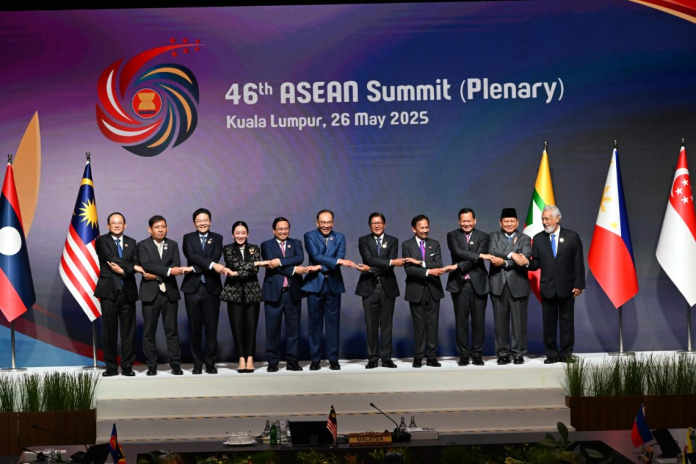The 46th Association of Southeast Asian Nations (ASEAN) Summit commenced on 26 May 2025 in Kuala Lumpur, with leaders from the 10-member bloc convening to address pressing regional challenges.
Malaysian Prime Minister Anwar Ibrahim, presiding as ASEAN’s rotating chair, opened the summit by warning of a global trade system “breaking apart at the seams” under the strain of unilateral protectionism.
Protectionism is resurging as we bear witness to multilateralism breaking apart at the seams.
Anwar revealed he had formally requested an ASEAN-US summit to resolve trade tensions, citing US tariffs of 10–49% on ASEAN goods—temporarily paused for 90 days in April—as a critical threat to regional prosperity.
The tariffs, part of US President Donald Trump’s broader trade policy, spurred urgent negotiations between ASEAN and Washington, with Anwar emphasising the bloc’s resilience.
But again, I strongly believe in the fortitude and staying power of ASEAN to withstand the headwinds and weather the storms of the challenges and uncertainties facing us.
The summit’s agenda also prioritised Myanmar’s protracted civil conflict and South China Sea territorial disputes, though details on proposed resolutions remained sparse. Anwar stressed ASEAN’s commitment to “inclusivity, the rule of law, and open trade,” principles he argued are eroding globally.
ASEAN 2045 vision and regional unity
A focal point of the summit was the signing of the Kuala Lumpur Declaration on ASEAN 2045: Our Shared Future, a strategic blueprint aimed at reinforcing regional cohesion and economic integration. The declaration aligns with Malaysia’s chairmanship theme of fostering a “people-centred, responsive, and resilient” ASEAN community, as Anwar pledged to steer the bloc toward long-term stability.
The event also featured unprecedented engagement with external partners, including the inaugural ASEAN-China-Gulf Cooperation Council (GCC) summit, highlighting China’s role as the region’s largest economic partner. Anwar underscored the need to strengthen ties with “friendly partners” to counterbalance geopolitical fractures.
Side sessions included dialogues with youth representatives, parliamentary leaders, and the ASEAN Business Advisory Council (ASEAN-BAC). Malaysia’s senior press secretary, Tunku Nashrul Abaidah, noted the summit’s economic significance for the host nation, particularly in boosting tourism and SME opportunities.
ASEAN’s 10 member states—Indonesia, Vietnam, Laos, Brunei, Thailand, Myanmar, the Philippines, Cambodia, Singapore, and Malaysia—face divergent challenges, from Myanmar’s instability to Vietnam’s South China Sea claims.
As the two-day summit progresses, attention will turn to the ASEAN-GCC and ASEAN-China meetings on 27 May, where trade, infrastructure, and digital connectivity are expected to dominate discussions.
